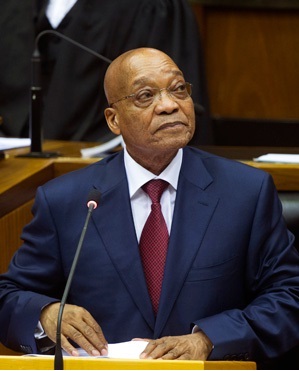By Lawson Naidoo
 President Jacob Zuma (AP)
President Jacob Zuma (AP)
The proposition that “The calls for Msholozi to resign are fundamentally, if not brazenly, unconstitutional ...” cannot go unchallenged (Ken Sibanda, “Power Lies in the Ballot”, City Press, May 7 2017).
It is a treacherous distortion that any self-respecting lawyer should be ashamed of.
It is surely not asking too much of someone who pens an article to familiarise themselves with the issues at hand.
It is disconcerting that, 23 years into our democracy, one has to school a lawyer-cum-film director in the basics of our Constitution.
The audacity of his article may mislead and lay the basis for an improper defence of President Jacob Zuma.
South Africa is a constitutional democracy, with separation of powers between the legislature, executive and judiciary.
We do not have a directly elected president as Sibanda seeks to portray – the people elect 400 National Assembly MPs, and that body elects a president from their ranks.
The Constitution could not be clearer: it states in section 42(3), “The National Assembly is elected to represent the people and to ensure government by the people under the Constitution.
"It does this by choosing the President, by providing a national forum for public consideration of issues, by passing legislation and by scrutinising and overseeing executive action.”
The president is accountable to the National Assembly, not the general electorate; serves while having the confidence of the body; and does not enjoy a popular mandate that overrides the will of the elected legislature.
The Constitution confers on the National Assembly the power to not only elect presidents but also remove them from office
It does so through following the processes established in either section 89 (Removal of President (or impeachment)) or section 102 (Motions of no confidence).
These provisions imply that there is no fixed five-year term.
The civil and political rights that we enjoy under the Constitution should not merely be tolerated – without them our democracy would be meaningless, and undermine the central notion of a participatory democracy.
We have a responsibility to speak out when leaders betray our trust or breach the social contract under which we permit them to govern.
In return, the Constitution demands from them accountability, responsiveness and openness.
Parliament should, in holding the president to account, ensure these values are respected.
The Constitutional Court in the Nkandla case found that Zuma violated his constitutional responsibilities, thus his “right to govern” had been found wanting.
This is exacerbated by the allegations in the Public Protector’s State of Capture Report, amid other constitutional transgressions and examples of failing to act in the national interest.
When the president disrespects the people, the people should retort.
This is not tantamount to civil war, it is an expression of democratic discontent. Zuma has earned and fully deserves our wrath.
The call for President Zuma to step down has come from a cross-section of society, from alliance partners, religious and business leaders, civil society groups and stalwarts of the president’s own political home.
They do so in the national interest. That opposition political parties also make this call in their own self-interest should not detract from this fundamental perspective.
Tomorrow the Constitutional Court will hear argument from political parties and civil society groups for a secret ballot when the National Assembly votes on a motion of no confidence in the president.
The Constitution requires, where the election for president is contested by two or more candidates, that a secret ballot be used.
The election of the president is as much a part of the National Assembly exercising its oversight as is a motion of no confidence, and similar processes should pertain.
The decision of the Court will determine how that oversight is to be squared with the MPs’ oath of office.
While transparency is a hallmark of our democracy, when MPs need to hold the president to account, their oath of office which requires them to be faithful to the republic, and to obey and respect the Constitution should trump their allegiance to a party line.
This is necessary to protect MPs from harassment and intimidation or loss of office if they fail to do as their party leader, who also happens to be the president, demands.
Voting with their consciences, as it is commonly put, requires MPs to listen to and reflect the will of the electorate.
Let’s hope the court permits them to do just that.
This article first appeared in News24 on 14 May 2017.

Comments
Keep comments free of racism, sexism, homophobia and abusive language. People's Assembly reserves the right to delete and edit comments
(For newest comments first please choose 'Newest' from the 'Sort by' dropdown below.)